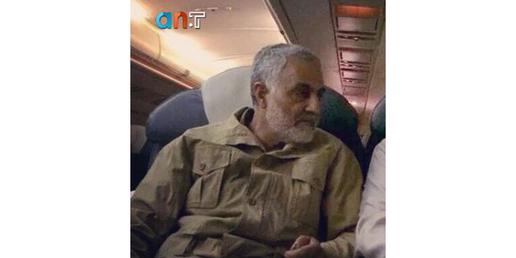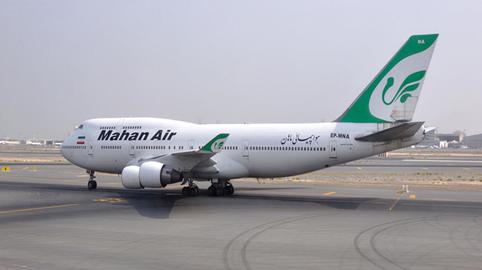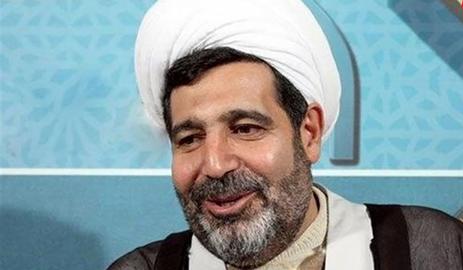A Mahan Air pilot has described how he transported Quds Force Commander Ghasem Soleimani to Syria and helped disguise him when the plane was ordered to land in Baghdad for inspection.
The pilot, Amir Asadollahi, recalled in an interview with Khabar Online that in June 2013, Soleimani — who was killed by American drones in January 2020 — was one of 200 passengers on a plane that was also transporting "seven tons of prohibited cargo” from Tehran to Damascus.
Asadollahi said when the plane was about to enter Iraqi airspace, he requested permission from officials based as Baghdad Airport's watchtower to enter the country's airspace. Often these requests were met with instructions to land and for an inspection of the aircraft to be carried out. On this occasion, after initially granting permission for the plane to pass over Iraqi airspace, officials ordered the pilot to land. Asadollahi says he refused because he knew US forces were in control of the airport, but his refusal met with threats that the airplane would be fired upon, so he had no choice but to land. He said Soleimani was in the cockpit, witnessed the argument, and told him to land. Mahan Air has denied the allegations.
The captain then went on to say that he had asked the flight engineer, who was sitting among the passengers, to swap clothes with Soleimani so that the commander could remain in the cockpit wearing the engineer’s uniform when the plane landed. Upon landing, the flight’s passengers were checked by US forces, who the pilot said were looking for Soleimani, but they did not inspect the cabin. Iraqi officials then called for an inspection of the cargo.
Asadollahi said it is the duty of the flight engineer to open the cargo area, but because the engineer was sitting among the passengers without a uniform, he himself went to the cargo hold with the officers. One of them entered the hold alongside him and ordered him to open one of the boxes. But in the end, the official agreed to a bribe in US dollars, the inspection came to a close and the plane was allowed to fly to Damascus.
Major Violations
If true, what Captain Asadollahi says reveals several major aviation violations.
The Mahan Air airbus was a civilian passenger plane on route from Tehran to Damascus, and yet the cargo area of the plane was carrying seven tons of prohibited items, quite possibly weapons and ammunition that endangered the safety and lives of the passengers.
Secondly, Ghasem Soleimani, as commander of the Quds Force, the Islamic Revolutionary Guard Corps’ unit for foreign operations, must have traveled to Syria with his senior commanders, military advisers, and bodyguards, all of whom are considered to be military personnel.
According to International Civil Aviation Organization regulations, the transport of weapons and explosives by civilian aircraft is prohibited due to the serious risks it poses to passengers. The Mahan Air airbus was not only carrying seven tons of weapons and explosives on a civilian plane, but also transported a senior Guards commander and other accompanying soldiers to Syria under the guise of being civilians. Again, the risk to actual civilians would have been high, not least because of the possibility of conflict and being targeted by another military force. Such activity is prohibited under international aviation law.
Sanctions
Captain Asadollahi also told Khabar Online that the flight or others like it would most likely be one of the reasons the United States brought sanctions against the airline. In addition, Soleimani was a member of the board of trustees of Mol Al-Movahedin Charitable Foundation in Kerman province, which owns Mahan Airlines.
In June 2013, both the Islamic Republic of Iran and Syria were subject to arms embargoes, and according to United Nations Security Council resolutions, third parties were allowed to seize ammunition and weapons shipped to or from the two countries.
The information provided by the pilot clearly indicates that Iran violated relevant UN Security Council resolutions and put civilian passengers at greater risk. Asadollahi himself violated safety regulations by allowing a military commander to pose as a civilian; he also broke Iraqi law by bribing Iraqi officials.
Although Iranian military personnel and other officials were aware of the dangers, Mahan Air did not request permission to enter Iraqi airspace before the plane left Iran, and only asked for permission to cross Iraq into Syria when it was close to the border between Iranian and Iraqi airspace.
Mahan Air is the second-largest airline in Iran. Because of the company's involvement in the Syrian war and its impact on Iraq and the region, the United States has labeled Mahan Air as a "sponsor of terrorism.” The US State Department has called for a global embargo on the company for "spreading a wide range of weapons of mass destruction." So far, France, Germany, and Italy have refused to renew Mahan Air licenses, and Britain, which was preparing to re-allow Mahan Air flights to its cities in 2015, never re-issued a permit.
Brigadier Nosratollah Hosseinipour of the Quds force said in November 2019 that "the transfer of troops to Syria was only possible with the mighty planes of Mahan Air, which saved us and managed to land in Damascus airport and bring in forces under enemy fire.”
Now, with a pilot of one of the airline’s passenger airbuses coming forth with his account of working for the company, the US will consider itself vindicated in its decision to impose sanctions, and the other countries that have banned its planes from their airspace are unlikely to reverse their decisions anytime soon.
visit the accountability section
In this section of Iran Wire, you can contact the officials and launch your campaign for various problems


























comments